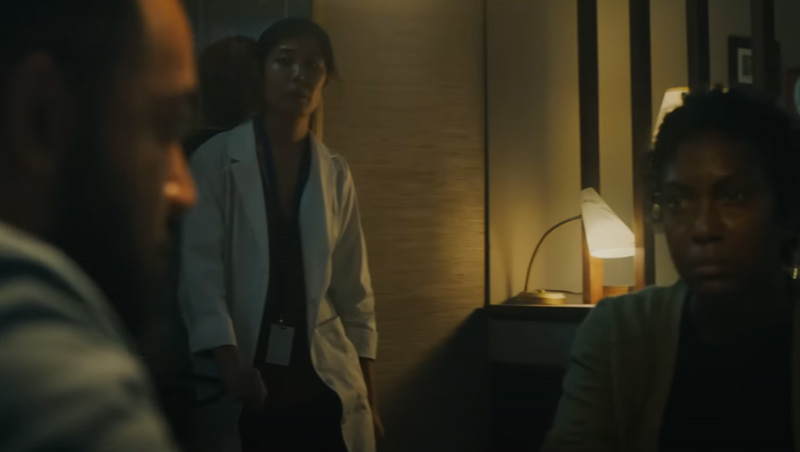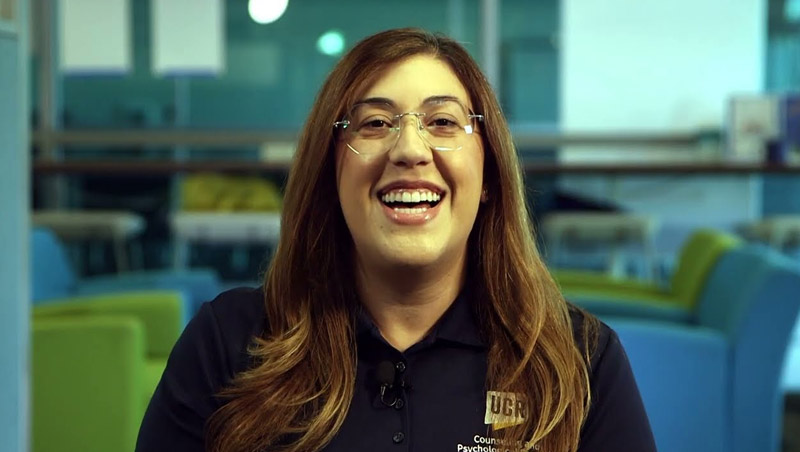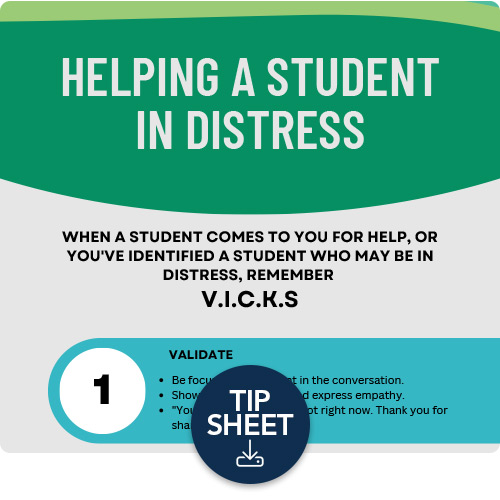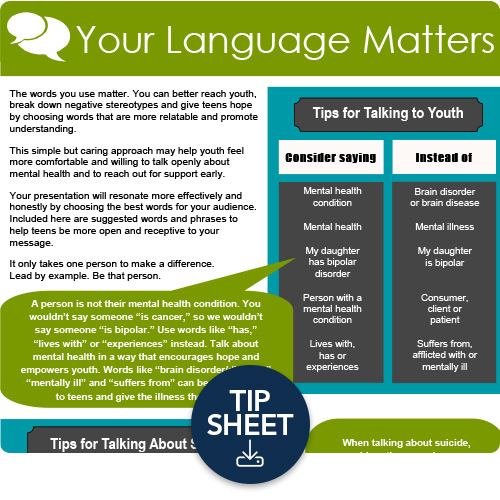
Suicide Prevention
We're in this together
You're not alone. If you, or someone you know, is contemplating suicide or self-harm, Moreno Valley College is a community willing to listen and provide resources.
Reach Out for Help Resources Helping Students in Distress (pdf)
Need immediate help?
For physical health emergencies, call 911.
For mental health emergencies, call 988.
Build Your Community
Suicide isn't simple, but giving a helping hand can be
There is not one singular cause for suicide; instead, suicide is often the result of a combination of multiple factors. As humans, we all experience difficulties that can increase our risk of suicide.
When noticing any negative emotions in yourself or in others, it is important to validate them and ask for help when needed. By learning how to recognize the warning signs of mental health challenges and learning how to help, such as how to talk to those around you, practice self-care, manage emotions, and accessing help, you can work toward overcoming those suicidal thoughts.
Risk factors are characteristics at the individual, relationship, community, or societal level that increase our risk of trying to take our own life. Protective factors are conditions or characteristics that help counteract our risk factors and protect us from suicide.
Most people who are experiencing thoughts of suicide will show signs that they are suicidal. We may notice these signs in their interactions or in their appearance. If you observe a warning sign in someone you know, it is important to check in with the person and ask about the change you noticed, especially if the behavior is new or has gotten worse.
Warning signs will look different depending on characteristics like age, gender, and culture. If you notice signs, have a conversation and connect them to help.
- Withdrawal or reckless behavior
- Talking about suicide or death
- Sudden changes in mood
- Giving away possessions and putting affairs in order
- Increased substance use
- Reporting feelings of hopelessness and helplessness
- Feeling like a burden to others
Suicide is less likely in those with "protective" factors. We can help others develop or recognize these protective factors.
- Effective coping and problem solving skills
- Reasons for living (family, friends, pets, etc.)
- Support from partners, friends, family
- Having goals for the future
- Feeling connected to school or community
- Limited access to lethal means (such as firearms or medication)
- Cultural and spiritual beliefs that encourage connection, helpseeking and create a strong sense of purpose or self-esteem
The language we use surrounding mental health and suicide matters. We can lessen stigma by changing the way we talk about mental health and suicide. Using nonjudgmental language may help people feel more comfortable and willing to talk about their mental health and reach out for help more quickly.
When talking to someone about suicide, it’s important to remember:
- Have some resources prepared before starting the conversation so you can easily provide them.
- Mention any signs you noticed that made you want to ask about suicide.
- Ask specifically about suicide, so you know you are on the same page. For example: “are you thinking about suicide?”
- Listen and let them know you care. It’s important they feel heard during this conversation.
- Help connect them to resources and create a safety plan.
When someone comes to you reporting distress or thoughts of suicide, follow the VICKS process:
- Validate. Be focused and present, show you understand, express empathy, acknowledge their difficulties and thank them for sharing and for their bravery.
- Identify. Notice out loud and express your concern. Suffering in silence is common, and simply expressing concern and that you notice them struggling can go a long way.
- Care. Communicate your care and intentions. Let them know you're an ally and that you want to connect them to support and resources.
- Knowledge. Share your knowledge of resources available to them, and help them take the steps needed to reach out for trained support.
- Support and self-care. Not only should you assist students with connecting to resources, but you should make sure to take time to process and see to your own wellness, too.
- Don't promise secrecy. Thoughts of suicide are serious, and everyone's life has value and their safety is first priority. Encourage them to reach out for help, and help them take that first step.
- Don't ask if they're considering suicide in ways that imply you want them to say no. Be receptive to their struggles, and ensure you ask questions without judgment so they feel safe to share.
- Don't attempt to use reverse psychology. Even if we get scared when those we care about are sharing such struggles, scaring or dismissing someone who is vulnerable can be dangerous. We can best help when we put our own feelings aside. Validate their feelings, be willing to listen, and demonstrate care by connecting them to professional resources. And make sure to practice some self-care after the fact.
Local Resources
- Inland SoCal HELPLine: (951) 686-4357
- Inland Empire Mental Health Urgent Care
- Riverside: (951) 509-2499 (ages 18+)
- Perris: (951) 349-4195 (ages 13+)
- Palm Springs: (442) 268-7000 (ages 13+)
National Resources
- Suicide and Crisis Lifeline: 988
- Crisis Text Line: 741-741
- Trevor Project LGBTQ+
- Hotline: (866) 488-7386
- Text line: ‘START’ to 678- 678.
Free Mental Health and Wellness Apps
- MY3 is a free app that allows you to create a network you can reach out to when you are feeling suicidal.
- Relax with Andrew Johnson Lite is a set of guided meditations to help reduce stress and promote sleep.
- MindShift is an app that teaches relaxation skills and helps reframe anxious thoughts.
You matter. We care.


Prevention Resources
To request and schedule a training, please contact MVC Mental Health Supervisor, Lynnette Sullivan. You may request from the following trainings:
- Mental Health First Aid Youth: A full-day training on supporting youth ages 12–18. Learn to recognize mental health challenges, respond to crises using the MHFA Action Plan (ALGEE), reduce stigma, encourage self-care, and connect young people with professional help.
- LivingWorks SafeTALK: A 3-4 hour, in-person suicide alertness training designed for ages 15 or older, aiming to help participants identify people with thoughts of suicide and connect them directly to safety resources.
- Question, Persuade, Refer (QPR): A 2-hour suicide prevention training designed to identify warning signs, query individuals about suicidal thoughts, persuade them to seek help, and refer them to appropriate resources.
Know the Signs Virtual Presentation
- Fourth Thursday of every month, 2 - 4 pm
Contact Us
If you need immediate help, call 988 to reach the National Suicide Prevention Hotline.
For assistance and resources, the Wellness Center is available during business hours. Students also have access to 24/7 support through Timely Care.
-
 Immediate Help
Immediate HelpDial 988 -
 Call Us
Call Us(951) 571-6103 -
 Email Us
Email Us
Talking Can Help
-
The Trevor Project
National LGBTQIA Crisis Line offering free, professional, confidential support all day, every day. Call 866-488-7386. -
National Crisis Textline
Text “Home” or “Hello” to 741741 to text confidentially with a trained crisis counselor for free, 24/7. -
Inland SoCal Crisis & Suicide Helpline
24/7 Crisis and suicide prevention hotline. Call 951-686-HELP (4357). -
CA Warmline
Non-emergency resource for anyone in California seeking mental and emotional support. Call 855-845-7415.
Mental Health Urgent Care
-
MHUC Riverside
9990 County Farm Rd, Bldg. 2, Riverside 92503 (ages 18+). Call (951) 509-2499. -
MHUC Perris
85 Ramona Expressway, Ste. 1-3, Perris 92571 (ages 13+). Call (951) 349-4195. -
MHUC Palm Springs
2500 N. Palm Canyon Drive, Suite A1-A4 Palm Springs, CA 92262 (ages 13+). (760) 424-5602. -
Telecare Riverside Crisis Stabilization Services
Call (760) 863-8600 or (760) 863-8455. Se Habla Español.


